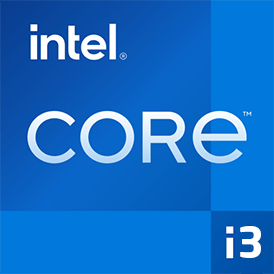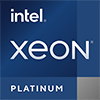
Intel Core i3-8109U Benchmark, test e specifiche
Ultimo aggiornamento:
Intel Core i3-8109U è un core processor 2. Può gestire 4 thread contemporaneamente ed è stato introdotto il Q4/2017. Si basa sul 8. Gen della serie Intel Core i3 e richiede una scheda madre con il socket BGA 1528. Intel Core i3-8109U ottiene 881 punti con un core CPU nel benchmark Geekbench 5. Quando si utilizzano tutti i core della CPU, il risultato è 2.021 punti.

| Cognome: | Intel Core i3-8109U |
|---|---|
| Famiglia: | Intel Core i3 (205) |
| Gruppo CPU: | Intel Core i 8000U (8) |
| Architettura : | Coffee Lake U |
| Segmento: | Mobile |
| Generazione: | 8 |
| Predecessore: | -- |
| Successore: | -- |
CPU Cores e frequenza di base
I 2 core della CPU del Intel Core i3-8109U clock con 3,00 GHz (3,60 GHz). Il numero di core della CPU e la frequenza di clock del processore sono in gran parte responsabili delle prestazioni complessive.
| CPU Cores / Threads: | 2 / 4 |
|---|---|
| Architettura principale: | normal |
| Cores: | 2x |
| Hyperthreading / SMT: | Si |
|---|---|
| Overclocking: | No |
| Frequenza: | 3,00 GHz |
| Turbo Frequenza (1 Core ): | 3,60 GHz |
| Turbo Frequenza (2 Cores): | 3,20 GHz |
Grafica interna
Con Intel Iris Plus Graphics 655, Intel Core i3-8109U ha una grafica integrata. Questo ha 48 processori SM, che hanno un totale di 384 texture shader. L'iGPU non solo abilita i giochi, ma accelera anche in modo significativo la riproduzione di video, ad esempio.
| nome GPU: | Intel Iris Plus Graphics 655 |
|---|---|
| Frequenza GPU : | 0,30 GHz |
| GPU (Turbo ): | 1,05 GHz |
| Unità di esecuzione: | 48 |
| Shader: | 384 |
| Hardware Raytracing: | No |
| Data di lancio : | Q4/2017 |
| Max. visualizzazioni: | 3 |
|---|---|
| Generation: | 9.5 |
| Direct X: | 12 |
| Tecnologia : | 14 nm |
| Max. GPU Memoria: | 32 GB |
| Frame Generation: | No |
Hardware codec support
I processori con grafica integrata possono elaborare e riprodurre video in modo più rapido ed efficiente. Ciò può avere un effetto positivo sulla durata della batteria dei notebook, ad esempio.
| h265 / HEVC (8 bit): | Decodificare / Codificare |
|---|---|
| h265 / HEVC (10 bit): | Decodificare / Codificare |
| h264: | Decodificare / Codificare |
| VP8: | Decodificare / Codificare |
| VP9: | Decodificare / Codificare |
| AV1: | No |
|---|---|
| AVC: | Decodificare / Codificare |
| VC-1: | Decodificare |
| JPEG: | Decodificare / Codificare |
Memoria & PCIeIntel Core i3-8109U supporta fino a 32 GB memoria in un massimo di 2 (Dual Channel) canali di memoria. Ciò si traduce in una larghezza di banda di memoria massima di 38,4 GB/s. |
|
| Tipo di memoria : | Banda di memoria: |
|---|---|
| LPDDR3-2133 DDR4-2400 | 34,2 GB/s 38,4 GB/s |
| Max. Memoria: | 32 GB |
| Canali di memoria : | 2 (Dual Channel) |
| ECC: | Si |
| PCIe: | 3.0 x 16 |
| PCIe Larghezza di banda: | 15,8 GB/s |
Gestione termicaCon il TDP, il produttore del processore specifica la soluzione di raffreddamento necessaria per il processore. Intel Core i3-8109U ha un TDP di 28 W. |
|
|---|---|
| TDP (PL1 / PBP): | 28 W |
| TDP (PL2): | -- |
| TDP up: | -- |
| TDP down: | 20 W |
| Tjunction max.: | 100 °C |
Dettagli tecnici
Intel Core i3-8109U ha una cache grande 4,00 MB. Il processore è prodotto in %%Manufacturing%%. La produzione moderna aumenta l'efficienza del processore.
| Tecnologia : | 14 nm |
|---|---|
| Design a chip: | Monolitico |
| Presa: | BGA 1528 |
| L2-Cache: | -- |
| L3-Cache: | 4,00 MB |
| AES-NI: | Si |
| Sistemi operativi: | Windows 10, Windows 11, Linux |
| Virtualizzazione: | VT-x, VT-x EPT, VT-d |
|---|---|
| Set di istruzioni (ISA): | x86-64 (64 bit) |
| Estensioni ISA: | SSE4.1, SSE4.2, AVX2 |
| Data di lancio : | Q4/2017 |
| Prezzo di rilascio: | -- |
| Numero di parte: | -- |
| Documenti: | Scheda tecnica |
Valuta questo processore
Risultati di benchmark

I risultati del benchmark per Intel Core i3-8109U sono stati attentamente controllati da noi. Pubblichiamo solo risultati di benchmark che sono stati creati da noi o che sono stati inviati da un visitatore e poi controllati da un membro del team. Tutti i risultati sono basati e rispettano le nostre linee guida di benchmark.
Schermate:
Schermate:
- Cinebench R15 on Intel NUC8i3BEH (8GB DDR4-2400), Windows 10
- AIDA64 CPUID on Intel NUC8i3BEH (8GB DDR4-2400), Windows 10
- AIDA64 iGPU Benchmark on Intel NUC8i3BEH (8GB DDR4-2400), Windows 10
- AIDA64 Cache & Memory Benchmark on Intel NUC8i3BEH (8GB DDR4-2400), Windows 10
Cinebench 2024 (Single-Core)
Il benchmark Cinebench 2024 si basa sul motore di rendering Redshift, utilizzato anche nel programma 3D di Maxon Cinema 4D. Le corse di benchmark durano 10 minuti ciascuna per testare se il processore è limitato dalla generazione di calore.

|
AMD Ryzen 7 1700
8C 16T @ 3,70 GHz |
||

|
Valve Steam Deck (AMD Custom APU 0405)
4C 8T @ 3,50 GHz |
||

|
Intel Core i5-6500
4C 4T @ 3,60 GHz |
||
|
|
Intel Core i3-8109U
2C 4T @ 3,60 GHz |
||

|
Intel Core i5-8350U
4C 8T @ 3,60 GHz |
||

|
Intel Core i7-5960X
8C 16T @ 3,50 GHz |
||

|
AMD Ryzen 3 3200G
4C 4T @ 4,00 GHz |
||
Cinebench 2024 (Multi-Core)
Il test Multi-Core del benchmark Cinebench 2024 utilizza tutti i core della CPU per eseguire il rendering utilizzando il motore di rendering Redshift, utilizzato anche in Maxons Cinema 4D. L'esecuzione del benchmark dura 10 minuti per verificare se il processore è limitato dalla generazione di calore.

|
Intel Pentium Gold 7505
2C 4T @ 3,50 GHz |
||

|
AMD Athlon 3000G
2C 4T @ 3,50 GHz |
||

|
Intel Core i5-6300U
2C 4T @ 3,00 GHz |
||
|
|
Intel Core i3-8109U
2C 4T @ 3,60 GHz |
||

|
Intel Processor N200
4C 4T @ 3,70 GHz |
||

|
Intel Core i5-5200U
2C 4T @ 2,70 GHz |
||

|
Intel Core i5-4200U
2C 4T @ 2,60 GHz |
||
Geekbench 5, 64bit (Single-Core)
Geekbench 5 è un benchmark multi-piattaforma che usa in modo intensivo la memoria del sistema.Il test single-core utilizza solo un nucleo elaborativo della CPU. A tal fine, il numero di nuclei elaborativi o la capacità di hyperthreading non sono rilevanti.

|
Intel Xeon E5-2660 v3
10C 20T @ 3,30 GHz |
||

|
Intel Core i7-7700HQ
4C 8T @ 3,80 GHz |
||

|
Intel Xeon Gold 5115
10C 20T @ 2,80 GHz |
||
|
|
Intel Core i3-8109U
2C 4T @ 3,60 GHz |
||

|
Intel Xeon Silver 4208
8C 16T @ 3,20 GHz |
||

|
Intel Core i5-4670
4C 4T @ 3,80 GHz |
||

|
Intel Core i5-L16G7
5C 5T @ 3,00 GHz |
||
Geekbench 5, 64bit (Multi-Core)
Geekbench 5 è un benchmark multi-piattaforma che usa in modo intensivo la memoria del sistema.Il test multi-core coinvolge tutti i nuclei elaborativi della CPU e si avvale del hyperthreading.

|
Intel Pentium G4560
2C 4T @ 3,50 GHz |
||

|
Intel Core i7-2710QE
4C 8T @ 2,10 GHz |
||

|
AMD Athlon 220GE
2C 4T @ 3,40 GHz |
||
|
|
Intel Core i3-8109U
2C 4T @ 3,20 GHz |
||

|
MediaTek MT8188J
8C 8T @ 2,20 GHz |
||

|
Intel Core i5-7260U
2C 4T @ 3,40 GHz |
||

|
AMD Athlon Gold 7220C
2C 4T @ 3,00 GHz |
||
Geekbench 6 (Single-Core)
Geekbench 6 è un punto di riferimento per computer, notebook e smartphone moderni. Ciò che è nuovo è un utilizzo ottimizzato delle architetture CPU più recenti, ad esempio basate sul concetto big.LITTLE e combinando core CPU di diverse dimensioni. Il benchmark single-core valuta solo le prestazioni del core della CPU più veloce, il numero di core della CPU in un processore è irrilevante qui.

|
Intel Xeon Gold 6142
16C 32T @ 3,70 GHz |
||

|
Intel Core i5-6500
4C 4T @ 3,60 GHz |
||

|
Intel Core i7-4790T
4C 8T @ 3,90 GHz |
||
|
|
Intel Core i3-8109U
2C 4T @ 3,60 GHz |
||

|
AMD Ryzen 5 PRO 3400G
4C 8T @ 4,20 GHz |
||

|
Intel Core i5-4690S
4C 4T @ 3,90 GHz |
||

|
AMD Athlon Gold 7220U
2C 4T @ 3,70 GHz |
||
Geekbench 6 (Multi-Core)
Geekbench 6 è un punto di riferimento per computer, notebook e smartphone moderni. Ciò che è nuovo è un utilizzo ottimizzato delle architetture CPU più recenti, ad esempio basate sul concetto big.LITTLE e combinando core CPU di diverse dimensioni. Il benchmark multi-core valuta le prestazioni di tutti i core della CPU del processore. I miglioramenti del thread virtuale come AMD SMT o l'Hyper-Threading di Intel hanno un impatto positivo sul risultato del benchmark.

|
Qualcomm Snapdragon 780G
8C 8T @ 2,40 GHz |
||

|
Intel Core i5-7287U
2C 4T @ 3,70 GHz |
||

|
Intel Core i7-3770K
4C 8T @ 3,90 GHz |
||
|
|
Intel Core i3-8109U
2C 4T @ 3,20 GHz |
||

|
Intel Core i7-3740QM
4C 8T @ 2,70 GHz |
||

|
Intel Core i7-3820QM
4C 8T @ 2,70 GHz |
||

|
MediaTek Dimensity 7050
8C 8T @ 2,60 GHz |
||
Cinebench R20 (Single-Core)
Cinebench R20 è il successore di Cinebench R15 ed è anch'esso basato su Cinema 4D. Cinema 4D è un software usato a livello mondiale per creare forme in 3D. Il test single-core utilizza solo un nucleo elaborativo della CPU. A tal fine, il numero di nuclei elaborativi o la capacità di hyperthreading non sono rilevanti.

|
AMD Ryzen 7 3700U
4C 8T @ 4,00 GHz |
||

|
AMD Ryzen 7 3750H
4C 8T @ 4,00 GHz |
||

|
AMD Ryzen 7 3780U
4C 8T @ 4,00 GHz |
||
|
|
Intel Core i3-8109U
2C 4T @ 3,60 GHz |
||

|
Intel Core i5-10400T
6C 12T @ 3,60 GHz |
||

|
Intel Xeon Platinum 8256
4C 8T @ 3,90 GHz |
||

|
Intel Xeon Platinum 8260
24C 48T @ 3,90 GHz |
||
Cinebench R20 (Multi-Core)
Cinebench R20 è il successore di Cinebench R15 ed è anch'esso basato su Cinema 4D. Cinema 4D è un software usato a livello mondiale per creare forme in 3D. Il test multi-core coinvolge tutti i nuclei elaborativi della CPU e si avvale del hyperthreading.

|
AMD Ryzen 7 2700U
4C 8T @ 3,40 GHz |
||

|
Intel Core i5-4590T
4C 4T @ 2,50 GHz |
||

|
Intel Pentium Silver N6005
4C 4T @ 3,00 GHz |
||
|
|
Intel Core i3-8109U
2C 4T @ 3,20 GHz |
||

|
Intel Pentium Gold G5500
2C 4T @ 3,80 GHz |
||

|
Intel Core i3-6100
2C 4T @ 3,70 GHz |
||

|
AMD Phenom II X6 1055T
6C 6T @ 3,30 GHz |
||
iGPU - Prestazioni FP32 (GFLOPS a precisione singola)
Le prestazioni di calcolo teoriche dell'unità grafica interna del processore con precisione semplice (32 bit) in GFLOPS. GFLOPS indica quanti miliardi di operazioni in virgola mobile che l'iPPU può eseguire al secondo.

|
Intel Core i5-5350H
Intel Iris Pro Graphics 6200 @ 1,05 GHz |
||

|
Intel Core i5-5575R
Intel Iris Pro Graphics 6200 @ 1,05 GHz |
||

|
Intel Core i7-5750HQ
Intel Iris Pro Graphics 6200 @ 1,05 GHz |
||
|
|
Intel Core i3-8109U
Intel Iris Plus Graphics 655 @ 1,05 GHz |
||

|
Intel Core i5-5257U
Intel Iris Graphics 6100 @ 1,05 GHz |
||

|
Intel Core i5-4570R
Intel Iris Pro Graphics 5200 @ 1,25 GHz |
||

|
Intel Core i5-14500HX
Intel UHD Graphics 13th Gen (32 EU) @ 1,55 GHz |
||
Risultati stimati da PassMark CPU Mark
Alcune delle CPU elencate di seguito sono stati sottoposti a benchmarking da CPU-monkey. Tuttavia, la maggior parte delle CPU non sono state testate e i risultati sono stati stimati utilizzando una formula segreta di proprietà di CPU-monkey. Come tali, essi non riflettono con precisione i valori attuali di Passmark CPU Mark e non sono stati approvati da PAssMark Software Pty Ltd.

|
Intel Atom C3958
16C 16T @ 2,00 GHz |
||

|
Intel Celeron J6413
4C 4T @ 2,60 GHz |
||

|
Intel Pentium Gold G6405
2C 4T @ 4,10 GHz |
||
|
|
Intel Core i3-8109U
2C 4T @ 3,20 GHz |
||

|
Intel Core i5-3350P
4C 4T @ 3,10 GHz |
||

|
Intel Core i5-4430S
4C 4T @ 2,70 GHz |
||

|
Intel Core i7-7567U
2C 4T @ 3,90 GHz |
||
Cinebench R15 (Single-Core)
Cinebench R15 è il successore di Cinebench 11.5 ed è anch'esso basato su Cinema 4D. Cinema 4D è un software usato a livello mondiale per creare forme in 3D. Il test single-core utilizza solo un nucleo elaborativo della CPU. A tal fine, il numero di nuclei elaborativi o la capacità di hyperthreading non sono rilevanti.

|
Intel Core i7-5775R
4C 8T @ 3,80 GHz |
||

|
Intel Core i7-6700T
4C 8T @ 3,60 GHz |
||

|
Intel Xeon E5-2687W v2
8C 16T @ 4,00 GHz |
||
|
|
Intel Core i3-8109U
2C 4T @ 3,60 GHz |
||

|
Intel Core i7-4980HQ
4C 8T @ 4,00 GHz |
||

|
Intel Core i5-7360U
2C 4T @ 3,60 GHz |
||

|
Intel Core i7-6567U
2C 4T @ 3,60 GHz |
||
Cinebench R15 (Multi-Core)
Cinebench R15 è il successore di Cinebench 11.5 ed è anch'esso basato su Cinema 4D. Cinema 4D è un software usato a livello mondiale per creare forme in 3D. Il test multi-core coinvolge tutti i nuclei elaborativi della CPU e si avvale del hyperthreading.

|
Intel Core i5-7360U
2C 4T @ 3,60 GHz |
||

|
Intel Core i3-7300T
2C 4T @ 3,50 GHz |
||

|
Intel Pentium G4560
2C 4T @ 3,50 GHz |
||
|
|
Intel Core i3-8109U
2C 4T @ 3,20 GHz |
||

|
AMD Athlon PRO 300GE
2C 4T @ 3,40 GHz |
||

|
AMD Athlon 220GE
2C 4T @ 3,40 GHz |
||

|
Intel Core i5-7267U
2C 4T @ 3,50 GHz |
||
Benchmarks

Cinebench 2024 (SC)
272 inserimenti
272 inserimenti

Cinebench 2024 (MC)
271 inserimenti
271 inserimenti

Geekbench 5 (SC)
2.488 inserimenti
2.488 inserimenti

Geekbench 5 (MC)
2.461 inserimenti
2.461 inserimenti

Geekbench 6 (SC)
1.755 inserimenti
1.755 inserimenti

Geekbench 6 (MC)
1.703 inserimenti
1.703 inserimenti

Cinebench R20 (SC)
656 inserimenti
656 inserimenti

Cinebench R20 (MC)
604 inserimenti
604 inserimenti

FP32 SP (iGPU)
2.026 inserimenti
2.026 inserimenti

3DMark Timespy (iGPU)
512 inserimenti
512 inserimenti

PassMark CPU-Mark
2.392 inserimenti
2.392 inserimenti

Cinebench R15 (SC)
1.106 inserimenti
1.106 inserimenti

Cinebench R15 (MC)
1.101 inserimenti
1.101 inserimenti

Geekbench 3 (SC)
942 inserimenti
942 inserimenti

Geekbench 3 (MC)
938 inserimenti
938 inserimenti

Cinebench R11.5 (SC)
825 inserimenti
825 inserimenti

Cinebench R11.5 (MC)
836 inserimenti
836 inserimenti
Confronti più popolari
Torna all'indice




